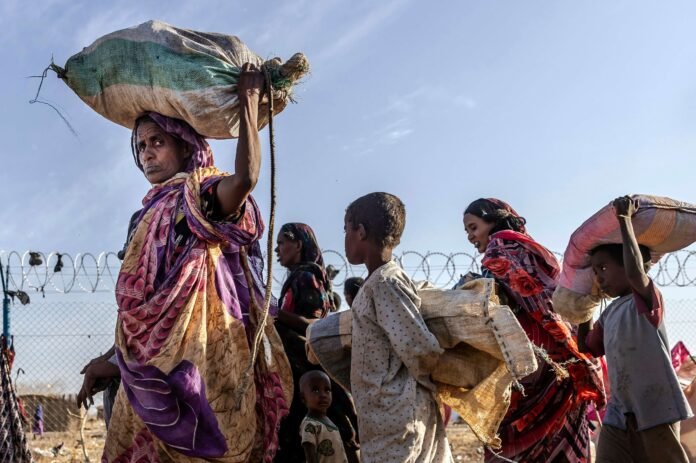Since the October 2021 coup, Sudan has been governed by a ruling coalition now operating out of Port Sudan amid escalating political and military tensions. Recent developments reveal that disputes over the distribution of government positions and control of vital resources – particularly the lucrative gold sector – remain key obstacles to stability.
In July 2025, Prime Minister Kamel Al-Tayeb Idris announced a cabinet reshuffle, appointing three new ministers and raising the total number of appointed ministers to five out of 22 portfolios. The move was widely seen as an attempt to restore internal order.
Nevertheless, credible sources indicated that “these appointments have failed to ease the growing tensions among the competing political and military factions vying for power and resources.” On the contrary, the struggle has intensified notably over control of gold resources, which have become the cornerstone of both economic and political conflict in eastern Sudan, according to a May 2025 report by the Sudan Human Rights Center.
The report noted that “the ever-shifting alliances among factions further complicate the political landscape and hinder pathways to peace and stability.”
Sudanese political analyst Dr. Mustafa Abdelrahman described the situation:
“Natural resources, especially gold, have become political weapons in the hands of factions seeking only to entrench their positions at the expense of peace and development.”
The fallout of sham trials and their Human Rights implications
Amid this climate, rights violations have escalated, as documented by both local and international organisations. A Human Rights Watch report published in 2024, condemned violations in Khartoum and Al-Jazirah State, describing them as ethnically and racially motivated killings and displacements. It noted among other atrocities, a notable surge in summary executions targeting civilians and individuals accused of supporting the armed opposition.
The organisation added that trials held in the Karrari and Omdurman criminal courts often lack the most basic guarantees of fair proceedings. The likes of Amnesty International have long raised concerns about a “wave of sham trials“, where defendants are convicted on vague charges with weak evidence, in addition to being denied the right to a full defense
These trials have included women and children, compounding the tragedy for families enduring a harsh reality and reflecting a flagrant violation of international human rights law.
The United Nations’ recent Special Rapport unpacking a series of human rights violations in Sudan stated:
“The widespread practices of arbitrary detention, torture and ill-treatment of detainees, and inhumane conditions of detention facilities, in contravention of international norms and standards, are deeply disturbing,” said UN High Commissioner for Human Rights Volker Türk.
“No individual should be deprived of their liberty without due process, nor – under any circumstances whatsoever – subjected to torture or other cruel, inhuman or degrading treatment or punishment.”
Humanitarian and rescue impact amid rising violence
The persistent violence has precipitated a major humanitarian crisis. Reports from the UN Office for the Coordination of Humanitarian Affairs (OCHA) in June indicated:
“The conflict has displaced more than 14 million people internally and externally, while over 24 million are in urgent need of humanitarian assistance.”
Military operations have targeted key agricultural areas in Darfur and Al-Jazirah State, severely damaging food security and depriving thousands of families of essential services including water, healthcare, and education.
In a statement issued in May, UNICEF warned that the escalating violence and insecurity pose grave threats to the lives of innocent children and civilians, noting that the continuous fighting “has severely restricted movement and disrupted humanitarian operations”. Hospitals are barely functioning, it added, potentially triggering a widespread health and humanitarian disaster.
International calls for accountability and an end to impunity
The United Nations has repeatedly called for independent and transparent investigations into the violations. In its April report, the Office of the High Commissioner for Human Rights (OHCHR) stated that the growing armed influence of extremist Islamic battalions such as the Sudan Shield Brigade and the Al-Baraa ibn Malik Brigade has fueled a wave of violence against civilians—particularly in Khartoum and Wad Madani—where serious abuses have occurred.
High Commissioner for Human Rights Volker Türk consistently calls for support for the International Criminal Court work in investigating and prosecuting those responsible for war crimes against humanity in war-torn countries like South Sudan.
Conclusion
Amid this complex reality, Sudan faces an escalating humanitarian tragedy, defined by armed conflict, sweeping violations, and political rivalries obstructing peace. Reports and statements from international human rights bodies underscore the interconnection of these crises and stress that resolution requires robust international support to uphold the rule of law, human rights, and a genuine reconciliation process that secures dignity and safety for the Sudanese people.
Civil society organisations in Sudan continue to call for an immediate end to violence, the release of political detainees, fair and transparent trials in line with international standards, unhindered humanitarian access to all affected areas, and the initiation of a comprehensive national dialogue that transcends political disputes over resources.
For more insights into pressing issues affecting South Africa and the continent at large, make sure to regularly visit the NOWinSA Africa News homepage.

